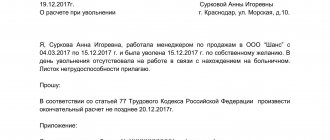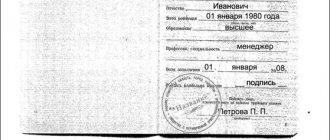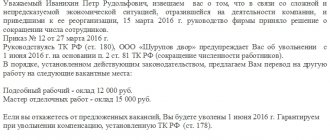The essence of depreciation of employees and legal regulation of the procedure
The Labor Code of the Russian Federation classifies bonuses as incentive payments to employees. This regulatory legal act does not contain anything else regarding it. The concept of “depreciation” is also not presented in it.
In practice, this means non-payment of established bonuses or a reduction in their size. Moreover, deprivation of bonuses cannot be used as a disciplinary sanction, since it is not presented in Art. 192 Labor Code of the Russian Federation.
This article contains a list of punishments that can be applied to an employee who has committed a disciplinary act.
However, in Art. 135 of this act indicates the right of the employer to independently establish, taking into account the opinion of the Trade Union, an incentive system, recording it in local documentation (collective agreement, regulations on bonuses or payment of labor remuneration, as well as employment contracts with employees).
Thus, the possibility of resorting to a reduction in bonuses is determined by the conditions for paying bonuses noted in the LNA (local regulations). For example, the Regulations on bonuses may indicate that if there is a disciplinary sanction or based on the results of unsatisfactory work for a certain period, the employee cannot count on additional funds.
In addition to the condition on deprivation of bonuses for the duration of the disciplinary sanction (most often - a year, according to Article 194 of the Labor Code), the Regulations must indicate other situations in which deprivation of bonuses is possible.
What is a premium
The Labor Code of the Russian Federation does not contain such a concept. This is the name given to a monthly or quarterly payment for high quality performance of duties, achievement of high results, for anniversaries, professional holidays. Employee salary, in accordance with Art. 129 of the Labor Code of the Russian Federation, includes bonuses as one of the elements. They are stimulating and motivating.
There is no exhaustive list of grounds for monetary incentives in the Labor Code of the Russian Federation. The payment is not the employer's obligation, it is his right. The enterprise develops a list of grounds independently, having approved it in orders. The procedure and terms are determined by local acts of the establishment, collective agreements, agreements (Articles 129, 191 of the Labor Code of the Russian Federation, Letter of the Ministry of Labor dated February 14, 2017 No. 14-1 / OOG-1293).
Grounds and reasons for deprivation of bonuses
Since the accrual of bonus payments correlates with the quality of work of a staff member, the following may be grounds for depreciation.
Ignoring the norms and rules of labor discipline
The LNA of each economic entity determines the labor regime that must be observed by employees. Ignoring it, that is, being late or leaving the workplace without permission, may result in deprivation of the bonus. However, you should take into account:
- duration of delay;
- the reason for such an action by the staff member (whether it is valid or not);
- other circumstances (the violation was recorded for the first time or was committed repeatedly).
Thus, in the case of a one-time subordinate being 10 minutes late due to external factors that he could not influence (traffic jam), a measure such as deprivation of bonuses is unlawful and can be challenged in court. In case of systematic delays without good reasons, it justifies itself.
Ignoring job responsibilities
Before employment, the applicant is familiarized with his job description and employment contract, which contains a list of his rights and responsibilities. Ignoring the latter or negligent attitude towards them (for example, failure to fulfill the established work plan and, consequently, causing losses to the employer) may cause deprivation of the bonus.
This also includes incorrect communication with counterparties and clients. Although such a concept as the ethics of business communication is generally not regulated at the legislative level (with the exception of some areas, for example, auditing), this does not mean that rules of conduct cannot be determined at the level of a business entity. In this case, they must be followed, since the company's reputation depends on it.
The basis for deprivation will be a negative review in the complaint book.
Violation of deadlines for submitting reports, if this is charged to the employee, is also considered a valid reason for deprivation of bonuses.
This may result in bringing a negligent subordinate to more serious liability, since such actions threaten penalties for the employer.
Action of disciplinary action
The most common reason for deprivation of bonuses, provided that it is stated in the Regulations on bonuses.
In case of early lifting of a penalty on the proposal of the immediate superior of the offender, bonuses will be calculated from this date.
Partial working time
Many employers provide bonuses to their subordinates based on the results of their work over a certain period of time (month, quarter, six months, year). Consequently, absence from work causes a reduction in payments.
The list of prerequisites remains open and can be supplemented in each individual situation (for example, such grounds as showing up at work while drunk, disorderly conduct, theft, ignoring health and safety rules and regulations, providing the administration with incorrect data, disclosing trade secrets, and so on).
How to place an order
There is no single form for all organizations on how to fill out an order for depreciation. It can be written in any form, but the main thing is to indicate the reason why this happens.
The bonus is calculated in accordance with the order established by the head of the company. In this case, the reduction is formalized in a similar way, but in this case it is not an act that records any misconduct by the employee. It is because of this that in the text of the order the company’s management avoids using terms that have a double interpretation.
So, instead of the word “deprivation”, “reduction” or “non-accrual” is used. The order itself should not be called “deduction of bonuses”, because this means canceling the accrual of bonuses, which is illegal.
How to draw up an order for bonuses for employees and what details need to be indicated in it - read this article.
Sample order for depreciation.
Memo for depreciation
This type of document is a method of internal communication between managers. The purpose of its use is to provide information about violations of an employee or an entire unit, indicate the reasons and the need for punishment of this kind.
The note also contains a proposal or request to take appropriate action. It is usually drawn up by the head of one of the departments in free form, however, some rules must be followed.
So, it is necessary to maintain a business style of speech and ethics, as well as certain design features:
- In the “header” you need to indicate the full name, as well as the position of the person to whom the note is written;
- The name of the document, its serial number and date;
- Next comes the main text;
- At the end, the position of the employee drawing up the note and signature indicating his full name are indicated.
Sample memo.
What is depreciation and what are its features?
Advantages and disadvantages of bonus reduction
Like any measure of influence, depreciation has certain advantages and disadvantages.
The first include:
- increasing the efficiency of staff and the interest of subordinates in the high-quality performance of their functions;
- a more responsible attitude towards assigned tasks;
- improvement of discipline.
The disadvantages are:
- employees neglecting the quality of tasks performed for the sake of their quantity;
- increased tension in the work team due to differentiation in bonus payments;
- decreased motivation to work for employees deprived of bonuses;
- decreased loyalty to management personnel.
Bonus reduction algorithm, sample memo and order
In order for a bonus deduction to be considered legal and not entail negative consequences for the manager, it is important for him to comply with all stages of this procedure, namely:
- receive from a middle manager a memorandum containing information about the misconduct of an individual person, or an act of violation committed by him, as well as an explanatory note from the guilty person, in which he explains the reasons for his behavior (however, the latter document is not required);
Therefore, the grounds for deprivation of bonuses must be documented.
- review the received papers, and then make a decision on applying partial or complete depreciation of the person;
- within a month from the moment the violation is discovered, issue an order to deprive the employee of bonuses.
The act of violation of labor discipline records information about the employee’s misconduct. It can be drawn up by any person with appropriate authority, for example, the head of a structural unit, a staff lawyer or a personnel employee. Witnesses or a special commission created from members of a work team of more than 3 people should be involved in the process.
There is no single unified sample act of violation, so you can write it in any form or use a template approved in the accounting policy (if any). The following document details are required:
- date, time, and place of its compilation;
- name of the business entity.
The main part contains the following information about the violator:
- his position;
- FULL NAME.;
- description of the violation.
You can draw up the act in printed form or by hand, on A4, A5 sheet or on company letterhead, with a regular ballpoint pen with blue ink, at least 2 copies. If necessary, copies should be made.
It must be signed by the compiler, the witnesses present during registration, and the violator himself. If the latter refuses to endorse the document, a special note is made about this.
It is not necessary to certify the act with a seal or stamp, since, firstly, it is an internal document, and, secondly, from 2021 they are used exclusively at the request of the company.
If such a norm is enshrined in the LNA, the papers need to be stamped.
After the act is drawn up and properly endorsed, it is recorded in the accounting journal, after which, together with the order of disciplinary action, it is formed into a folder. When the papers are no longer relevant, they are transferred to the company’s archive, where they are stored for as long as established by the LNA and the legislation of the Russian Federation (but not less than 36 months).
As for the order on depreciation, it is also drawn up in any form or according to a sample developed by the company (taking into account the provisions of Article 129 of the Labor Code of the Russian Federation).
It should correctly reflect the basis for depreciation. The wording should imply a refusal to accrue payment, and not the use of this measure as a punishment.
It is also necessary to familiarize the person repaired with it, in respect of whom the document contains administrative instructions.
In case of disagreement with the provisions of the order, the employee has the right to challenge them by contacting the labor dispute commission or the court.
Instructions for preparing a note
You need to understand that the document consists of several parts. If it is compiled incorrectly in large firms, it may be grounds for refusal to consider it.
| Chapter | Content |
| "A cap" | The name of the organization, full name and position of the director, and then the same information about the compiler. |
| Table of contents | A memo about reducing the employee's bonus or depriving him of this payment |
| The essence of the document | This section requires an indication of who, where and under what circumstances committed the offense. It is also important to indicate the consequences, if any. |
| Applications | Some offenses require documentary evidence. Then you need to draw up an act or other document that confirms the offense. Without applications, the service will look biased, so management, as a rule, ignores it. |
| date | You must indicate the date when the document was drawn up. It may not coincide with the time of handover to management. |
| Registration details | Each company must maintain document flow in accordance with the requirements established by law. Thus, the service must be registered in the journal of incoming documentation, giving it a serial number. An employee can provide two copies at once. On the second one you will need to indicate under what number the complaint was registered. |
The Labor Code provides several ways to record an offense. One of the methods should be an appendix to the memo.
| Fixation method | brief information |
| Infringement report | Necessary for dismissal or justification of disciplinary action |
| Report | Used when events are disrupted |
| Commission decision | A serious document that is usually used when a shortage or financial fraud is detected |
Nuances of the depreciation procedure
Based on the Labor Code, certain categories of workers deserve special treatment under certain circumstances. Therefore, you should know how to apply depreciation to them.
Depreciation of a pregnant woman
This employee practically cannot be fired; if she wishes, she can have an individual work schedule and take annual leave at a time convenient for herself. However, if she does not fulfill her duties or does it poorly, a bonus deduction can be applied to her in the general manner.
Combination of depreciation and disciplinary action
Many employers deprive the offending subordinate of a bonus and reprimand him with one order, justifying this by the fact that deprivation of bonuses is not a disciplinary sanction, since it is not contained in Art. 192 TK. However, Part 2 of this article allows it to be considered as such if it is specified in the LNA. In this case, the application of two disciplinary sanctions for one offense is unlawful (Article 193 of the Labor Code).
Deprivation of bonus to an employee undergoing treatment
If the depreciation order is due to certain violations committed by a subordinate who went on sick leave, the issuance of the document should be delayed until the employee leaves, since in this case he can prove the absence of guilt by presenting evidence and avoid disciplinary action.
If the bonus is correlated with the time worked (for example, for a month), then additional funds are not legally due to an employee who has taken long-term sick leave.
Deduction of bonuses for civil servants

According to clause 4, part 5, article 50 of Federal Law No. 79 of July 27, 2004, the procedure for bonuses and deductions is determined by the employer’s representative.
Taking into account the provisions of regional legislation, basic provisions are developed that take into account the tasks and functions of a particular government agency.
Consequently, it is allowed to apply bonuses to a civil servant in the same way as to any other employee.
Deprivation of manager's bonus
In most cases, the manager of a business entity is also an employee, but with an expanded range of powers. Therefore, only the founders can award or deprive him of bonuses, within the framework of the terms of the employment contract concluded with him.
To do this, an appropriate order must be issued (if there is only one founder) or minutes of the meeting of founders.
Deprivation of bonus during probation period
Taking into account the provisions of domestic legislation, an employee on a probationary period has the same rights and obligations as regular employees (Article 70 of the Labor Code).
From this it follows that it is legal to deprive him of his bonus.
This measure is relevant if the person has not demonstrated any special achievements during the probationary period. If they suffered damage, the employer has the right to choose between dismissal and deprivation of bonuses.
Deprivation of bonuses without familiarizing the subordinate with the order
An order issued in relation to a certain subordinate must be signed by him as a sign of familiarization with the contents. In case of refusal, an act of refusal is drawn up, and the decision to apply a disciplinary measure comes into force.
How to deprive a bonus
The legislator has not established an algorithm for deprivation. These rules must be prescribed in local acts of organizations. Drawing up a sample order for deprivation of a bonus is not enough. Before making a decision on the reduction of bonuses, the employer takes a number of steps.
Step 1. Check documents regarding payment:
- an employment agreement with an employee (if it contains a provision that the bonus is part of the salary, it cannot be deprived - Part 2 of Article 22 of the Labor Code of the Russian Federation; if the bonus is defined as a payment at the discretion of the employer, assigned in the manner determined by a local act, it is possible) ;
- local act of the enterprise on bonuses (must include provisions that the payment is not the responsibility of the employer, it is not guaranteed, not fixed, and depends on the fulfillment of established conditions);
- collective agreement (if any).
Step 2. Draw up a memo documenting the fact of violation to the manager. The employee's immediate supervisor reflects in it the grounds for deprivation of bonuses.
Step 3. Conduct an analysis of the grounds for compliance with their list established in the local act of the institution.
Step 4. Request an explanation from the employee regarding the stated facts.
Step 5. Decide to issue an order not to accrue money.
Step 6. Familiarize the employee with the order and sign it.
If the institution has its own rules, you need to follow them.
Challenging the deprivation of a bonus
Based on Art. 392 of the Labor Code, an employee who believes that he was deprived of a bonus illegally, and has evidence of this, has two options for challenging the administrative decision:
- appeal to a locally created (taking into account the provisions of Chapter 60 of the Labor Code of the Russian Federation) commission on labor disputes;
- initiation of legal proceedings.
The disadvantages of the second option are as follows:

the duration and cost of litigation (often the costs exceed the amount of the unpaid bonus), as well as the emergence of tense relations with the manager.- the need to provide documented evidence of managerial misconduct. Since the administration is not interested in public proceedings, it can prevent a subordinate from requesting documents, which will complicate the proceedings.
Proceedings within the framework of a business entity are more profitable in terms of monetary and time costs for both parties to the labor relationship. Thus, a conflict situation in which an employee finds himself must be considered within 10 days, and data for the investigation is requested by the members of the commission independently. And after local proceedings, management will not have problems with regulatory authorities.
At the same time, the decision of the commission, unlike a court verdict, is practically not subject to challenge. In addition, many workers do not trust the commission created from their colleagues, considering it an interested party in the proceedings.
Submitting a note
The timing for submitting a memo regarding the deprivation of a bonus depends on the period for which the bonus was planned to be accrued. For example, if we are talking about a monthly payment, then the document must be sent before the end of the month.
According to the law on processing citizens' appeals No. 59-FZ, each written message is subject to consideration by an official of the enterprise. The response must be sent to the author of the message within a 30-day period.
Sometimes the response to a memo is not always in writing. In this case, the head of the company is not obliged to explain his motivation.
It is mandatory to submit a complaint in writing and register it with the secretary. A situation may arise that violations of labor discipline will become systematic and will arouse the wrath of the director himself. Then the violator’s immediate superior may also be subject to investigation. He may be accused of neglect of his functions and connivance. Then all previously submitted but not approved proposals on the need to take disciplinary measures will serve as a kind of shield against unfounded claims.
Submitting a memo to deprive a bonus without sufficient grounds and evidence can serve as evidence of a biased attitude and an attempt to discriminate against a subordinate, which, in turn, will negatively affect the author of the document.
Arbitrage practice
During the proceedings, the court takes into account two components:
- evidence base;
- legislative norms.
Thus, satisfaction of an employee’s claim is possible in the following situations:
- the bonus, according to the employment contract and LNA, is a component of labor remuneration and was not paid;
- two types of punishment were applied simultaneously.
The consequences for the defendant will be as follows:
- payment of costs for conducting a trial (services of lawyers, advocates);
- liability in case of proof of violation of the law;
A decision in favor of the employer is made if the bonus deduction algorithm complies with the bonus regulations.
Pros and cons of bonus reduction
Such a system of calculating fines has its positive as well as negative sides. So, the first ones include:
- Improving discipline due to the possible loss of additional material rewards;
- Increasing the motivation of employees to achieve the desired level of performance due to their desire to receive additional money;
- The ability to award bonuses only to those employees who deserve it;
- Increasing employee responsibility.
However, there are certain disadvantages:
- Internal competition will appear in the team and tension will increase;
- The attitude of subordinates towards their superiors will worsen;
- In case of illegal deprivation of bonuses, motivation will decrease;
- The desire of workers to achieve the desired results at the expense of quality;
- Reduced labor discipline.
Here you can learn how to correctly draw up and formalize regulations on bonuses and material incentives for employees.






